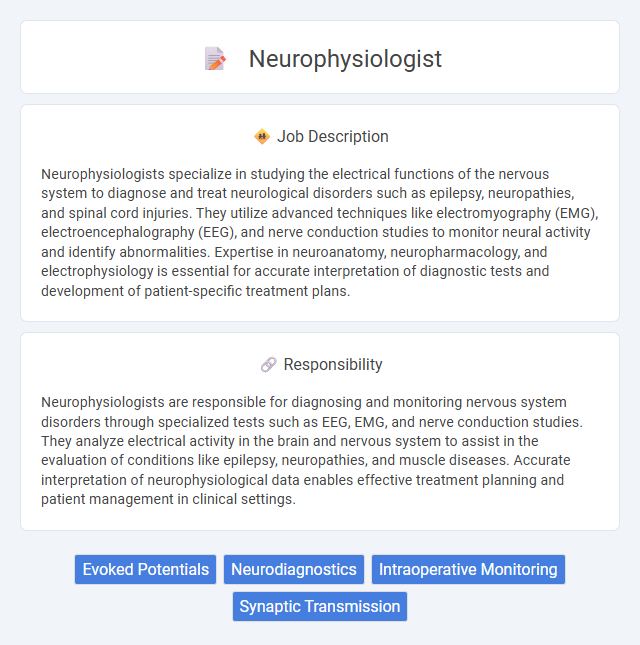
Neurophysiologists specialize in studying the electrical functions of the nervous system to diagnose and treat neurological disorders such as epilepsy, neuropathies, and spinal cord injuries. They utilize advanced techniques like electromyography (EMG), electroencephalography (EEG), and nerve conduction studies to monitor neural activity and identify abnormalities. Expertise in neuroanatomy, neuropharmacology, and electrophysiology is essential for accurate interpretation of diagnostic tests and development of patient-specific treatment plans.
Individuals with a strong interest in understanding the nervous system and neurological disorders are likely to find neurophysiology a suitable career. Those who enjoy detailed analysis, research, and working in clinical or laboratory settings might be well-matched to this profession. People uncomfortable with intensive study or prolonged periods of data interpretation may find the job less fitting for their skills and preferences.
Qualification
A neurophysiologist must possess a strong background in neuroscience or biology, typically requiring a master's or doctoral degree in neurophysiology or a related field. Proficiency in advanced diagnostic techniques such as EEG, EMG, and nerve conduction studies is essential for accurate assessment of nervous system function. Certification from recognized professional bodies, along with hands-on clinical experience, enhances job prospects and validates expertise in the field.
Responsibility
Neurophysiologists are responsible for diagnosing and monitoring nervous system disorders through specialized tests such as EEG, EMG, and nerve conduction studies. They analyze electrical activity in the brain and nervous system to assist in the evaluation of conditions like epilepsy, neuropathies, and muscle diseases. Accurate interpretation of neurophysiological data enables effective treatment planning and patient management in clinical settings.
Benefit
A career as a neurophysiologist likely offers significant benefits such as the opportunity to contribute to groundbreaking research in brain function and neurological disorders. Professionals in this field probably enjoy a high level of job satisfaction due to their role in improving patient outcomes and advancing medical knowledge. Competitive salaries and opportunities for academic and clinical collaboration may also be common advantages.
Challenge
The role of a neurophysiologist likely presents significant challenges involving the interpretation of complex neural data and the need for precise diagnostic skills. There is a considerable probability that staying updated with rapidly advancing neurotechnology and research could demand continuous learning and adaptation. Managing patient outcomes while navigating uncertainties in neurological conditions might also contribute to the job's inherent difficulties.
Career Advancement
Neurophysiologists specializing in brain and nervous system functions can advance their careers by gaining expertise in neurodiagnostic techniques such as EEG, EMG, and evoked potentials. Pursuing certifications from organizations like the American Board of Registration of Electroencephalographic and Evoked Potential Technologists (ABRET) enhances professional credibility and job prospects. Opportunities for career growth include research positions, leadership roles in clinical neurophysiology departments, and academic appointments in medical institutions.
Key Terms
Evoked Potentials
Neurophysiologists specializing in Evoked Potentials analyze electrical responses in the brain and nervous system triggered by sensory stimuli, aiding in the diagnosis of neurological disorders such as multiple sclerosis and peripheral neuropathies. They utilize techniques like visual, auditory, and somatosensory evoked potentials to assess neural pathway integrity and monitor surgical procedures. Expertise in interpreting waveform patterns and latency measurements is essential for accurate clinical evaluations and guiding treatment plans.
Neurodiagnostics
Neurophysiologists specializing in neurodiagnostics use advanced techniques like EEG, EMG, and nerve conduction studies to assess and diagnose neurological disorders. Their expertise in interpreting electrical activity within the nervous system is crucial for identifying conditions such as epilepsy, neuropathies, and muscle disorders. Precision in data analysis and collaboration with neurologists enhance patient outcomes through accurate diagnosis and targeted treatment plans.
Intraoperative Monitoring
Neurophysiologists specializing in Intraoperative Monitoring (IOM) play a critical role in assessing neural function during surgical procedures to prevent neurological damage. They utilize techniques such as electromyography (EMG), somatosensory evoked potentials (SSEPs), and electroencephalography (EEG) to provide real-time feedback on the nervous system's integrity. Expert knowledge in neuroanatomy and physiology combined with proficiency in advanced monitoring equipment ensures patient safety and optimal surgical outcomes.
Synaptic Transmission
Neurophysiologists specialize in studying synaptic transmission, the process by which neurons communicate through chemical and electrical signals at synapses. They analyze neurotransmitter release, receptor activity, and ion channel function to understand how information is transmitted and processed in the nervous system. Research on synaptic plasticity and signal modulation by neurophysiologists provides critical insights into learning, memory, and neurological disorders.
 kuljobs.com
kuljobs.com